Sherrod Brown
| Sherrod Brown | |
|---|---|
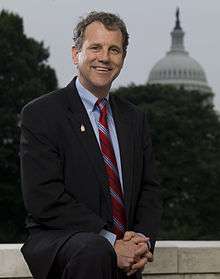 | |
| United States Senator from Ohio | |
|
Assumed office January 3, 2007 Serving with Rob Portman | |
| Preceded by | Mike DeWine |
| Vice Chair of the Joint Pensions Committee | |
|
Assumed office March 8, 2018 | |
| Preceded by | Position established |
| Ranking Member of the Senate Banking Committee | |
|
Assumed office January 3, 2015 | |
| Preceded by | Mike Crapo |
| Member of the U.S. House of Representatives from Ohio's 13th district | |
|
In office January 3, 1993 – January 3, 2007 | |
| Preceded by | Donald J. Pease |
| Succeeded by | Betty Sutton |
| 47th Secretary of State of Ohio | |
|
In office January 12, 1983 – January 14, 1991 | |
| Governor | Dick Celeste |
| Preceded by | Anthony J. Celebrezze Jr. |
| Succeeded by | Bob Taft |
| Member of the Ohio House of Representatives from the 61st district | |
|
In office January 3, 1975 – December 31, 1982 | |
| Preceded by | Joan Douglass |
| Succeeded by | Frank Sawyer |
| Personal details | |
| Born |
Sherrod Campbell Brown November 9, 1952 Mansfield, Ohio, U.S. |
| Political party | Democratic |
| Spouse(s) |
Larke Ummel (m. 1979; div. 1987) [1] |
| Children | 4 |
| Education |
Yale University (BA) Ohio State University (MA, MPA) |
| Signature |
|
| Website | Senate website |
Sherrod Campbell Brown (born November 9, 1952) is an American politician who is the senior United States Senator from Ohio, elected in 2006. A Democrat, he previously represented Ohio's 13th congressional district in the United States House of Representatives. Prior to that, he served as Ohio Secretary of State, after having been a member of the Ohio House of Representatives.
Brown defeated two-term Republican incumbent Mike DeWine in the 2006 Senate election and was re-elected in 2012, defeating state Treasurer Josh Mandel. In the Senate, he was chair of the Agriculture Subcommittee on Hunger, Nutrition and Family Farms and the Banking Subcommittee on Economic Policy, and is also a member of the Committee on Finance, the Committee on Veterans' Affairs, and Select Committee on Ethics. At the start of the 114th Congress in January 2015, Brown became the Ranking Democratic Member on the Committee on Banking, Housing, and Urban Affairs.[2] He was later appointed co-chair of the newly formed Joint Multiemployer Pension Solvency Committee in March 2018.[3]
Brown is running for reelection to a third term in 2018.
Early life, education, and academic career
Brown was born in Mansfield, Ohio, the son of Emily (née Campbell) and Charles Gailey Brown, M.D.[4] He is of Scottish descent and was named after his maternal grandfather. He became an Eagle Scout in 1967. He received a Bachelor of Arts degree in Russian studies from Yale University in 1974. At Yale, he lived in Davenport College. While in college, Brown campaigned for liberal politicians such as George McGovern.[5] He went on to receive a Master of Arts degree in education and a Master of Public Administration degree from Ohio State University at Columbus in 1979 and 1981, respectively. He taught at the Mansfield branch campus of Ohio State University from 1979 to 1981.[6] He backpacked in India during the state of emergency imposed by Prime Minister Indira Gandhi.[7]
Early political career
During his senior year in college, Brown was recruited by a local Democratic leader to run for Ohio's state house.[5] Brown served as a state representative in Ohio from 1974 to 1982. At the time of his election to the Ohio House, he was the youngest person elected to that body.[8] In 1982, Brown ran for Ohio Secretary of State to succeed Anthony J. Celebrezze Jr. Brown won a four-way Democratic primary that included Dennis Kucinich, then defeated Republican Virgil Brown in the general election. In 1986, Brown won re-election, defeating Vincent C. Campanella. As Secretary of State, Brown focused on voter registration outreach.[5] In 1990, Brown lost re-election in a heated campaign against Republican Bob Taft.[5]
U.S. House of Representatives
1993 elections
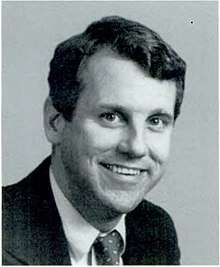

In 1992, Brown moved from Mansfield to Lorain, Ohio, and won a heavily contested Democratic primary for the open seat for Ohio's 13th district, located in the western and southern suburbs of Cleveland, after eight-term incumbent Don Pease announced his retirement. The Democratic-leaning district gave him an easy win over the little-known Republican Margaret R. Mueller. He was re-elected six times.[9]
Tenure
The Democrats lost their long-held House majority in the 1994 elections, and Democrats stayed in the minority for the remainder of Brown's tenure. As ranking member of the Energy and Commerce Health subcommittee, Brown successfully advocated for increased funding to fight tuberculosis.[5]
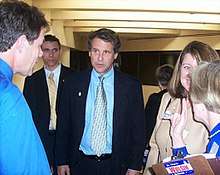
In 2005, Brown led the Democratic effort to block the Central American Free Trade Agreement (CAFTA). For many months, Brown worked as whip on the issue, securing Democratic "nay" votes and seeking Republican allies. After several delays, the House of Representatives finally voted on CAFTA after midnight on July 28, 2005, which ended in passage by one vote.[10]
Brown opposed an amendment to Ohio's constitution that banned same-sex marriage.[11] He was also one of the few U.S. Representatives to vote against the Defense of Marriage Act in 1996.[12]
Committee assignments
Brown was the ranking minority member on the House Energy and Commerce Committee's Health Subcommittee. He also served on the Subcommittee on Telecommunications and the Internet and the Subcommittee on Commerce, Trade and Consumer Protection. While serving on the House International Relations Committee, he was also a member of the Subcommittee on Asia and the Pacific.[13]
U.S. Senate
Brown, one of Bernie Sanders' closest allies in the U.S. Senate, endorsed Clinton and campaigned for her prior to the 2016 Democratic primary in Ohio.[14] Brown was vetted as a potential vice-presidential running mate for Hillary Clinton in 2016. The choice came down to Brown and Tim Kaine, with Kaine ultimately selected as Clinton's running mate.[15] Brown had the distinct disadvantage that should Clinton win, Ohio's Republican Governor John Kasich would get to choose Brown's replacement in the Senate, whereas Kaine's replacement would be chosen by Democrat and Clinton ally Terry McAuliffe.[16] Washington Monthly suggested that as a potential presidential candidate in 2020, Brown could unite the establishment and progressive wings of the Democratic Party.[17]
A staunch critic of free trade who has taken progressive stances on financial issues, Brown has said that the Democratic Party should place a stronger emphasis on progressive populism.[18]
Political positions
In 2011, in the National Journal’s annual rankings, Brown tied with eight other members for the title of the most liberal member of Congress.[19]
In a 2017 issue of Dissent, Michael Kazin introduced an interview with Brown by praising him as "a politician ahead of his time" and "perhaps the most class-conscious Democrat in Washington." Brown told Kazin that many Ohioans think "that people on the coasts look down on them" and blamed this notion on Fox News and the Wall Street Journal.[20]
Foreign policy

Brown opposed the Iraq War and voted against the Iraq Resolution as a House Representative.[21] He voted against the $87 billion war budgetary supplement. He also voted for redeploying US troops out of Iraq by March 2008.[22]
Brown voted for the Supplemental Appropriations Act, 2008, which appropriated $250 billion for ongoing military operations and domestic programs.[23]
In 2012, he co-sponsored a resolution to "oppose any policy that would rely on containment as an option in response to the Iranian nuclear threat."[24] In 2015, Brown co-sponsored an amendment to the budget that was unanimously approved by the Senate and that would reimpose sanctions on Iran if Iran violated the terms of the interim or final agreement by advancing its nuclear program.[25]
Brown was an original co-sponsor of the Taiwan Relations Act and the Six Assurances in regards to United States-Taiwan relations.[26]
Weeks after the 2014 Hong Kong class boycott campaign and Umbrella Movement broke out which demanded genuine universal suffrage among other goals, Brown (the chair of the Congressional-Executive Commission on China), along with co-chair U.S. Rep. Chris Smith and U.S. Senators Ben Cardin, Marco Rubio, Roger Wicker, Dianne Feinstein, and Jeff Merkley, and U.S. Representatives Nancy Pelosi, Dan Lipinski and Frank Wolf, introduced the Hong Kong Human Rights and Democracy Act, which would update the United States–Hong Kong Policy Act of 1992 and U.S. commitment to democratic development in Hong Kong.[27]
In 2017, Brown criticized U.S. support for Saudi Arabia's military campaign in Yemen, saying "It’s becoming increasingly clear that Saudi Arabia has been deliberately targeting civilian targets. And that’s absolutely unacceptable..."[28]
Terrorism
Brown voted in favor of the 2012 NDAA that sparked controversy over indefinite detention of US citizens.[29]
In December 2015, Brown co-sponsored a bill in Congress that would restrict ISIS's financing by authorizing new sanctions on foreign financial institutions that knowingly facilitate financial transactions with ISIS. The bill called for tightening international passport regulations and additional screening of persons attempting to enter the U.S. on certain types of visas. The bill would also provide grants to local law enforcement agencies to train for active shooter situations and terrorist attacks and to conduct cyber-training to identify and track extremists such as the couple behind the 2015 San Bernardino attack. Brown also called for banning those on the no fly list from purchasing assault weapons.[30][31][32]
Tax
Brown's opposition to the 2017 tax bill led to what was described as a "shouting match" with Senator Orrin Hatch of Utah, who accused Brown of "spouting off" to the effect that the tax bill benefited the rich.[33]
In March 2018, Vice President Mike Pence criticized Brown for his recent vote against the Republican tax bill (TCJA).[33] Brown had argued the bill overwhelmingly benefited wealthy individuals and corporations with a much smaller impact to the middle class.[34]
Veterans
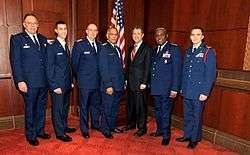
In 2014, Brown introduced the Gold Star Fathers Act of 2014 (S. 2323; 113th Congress), a bill that would expand preferred eligibility for federal jobs to the fathers of certain permanently disabled or deceased veterans.[35] Brown said that "when a service member is killed in action or permanently and totally disabled, the government should do its part to be there for grieving parents - no matter if they're fathers or mothers."[36]
In 2015, Brown and U.S. Rep. Tim Ryan (Ohio) introduced legislation that would give military veterans priority in scheduling classes in colleges, universities, and other post-secondary education programs.[37]
Energy and environment
In 2012, Brown co-sponsored the Responsible Electronics Recycling Act,[38] a bill that would prohibit the export of some electronics for environmental reasons.[39]
Gun rights
Brown consistently votes in favor of gun control, which has earned him a "F" rating from the National Rifle Association (NRA).[40] He has criticized the political influence of gun manufacturers.[41]
Brown called the Republican legislature in Ohio "lunatics" for introducing a concealed carry bill that would allow individuals to carry guns into airplane terminals (before security), police buildings, private airplanes, and day care facilities.[42]
In the wake of the Orlando nightclub shooting, Brown participated in the Chris Murphy gun control filibuster.[43] A few weeks later, Brown voted for the Feinstein Amendment, which would have barred any individual on the terrorist watchlist from buying a gun.[44]
In response to the 2017 Las Vegas shooting, Brown supported Dianne Feinstein's effort to ban bump stocks.[45]
Banking and finance industry
In February 2013, conservative commentator George F. Will wrote in support of Brown's proposal to break up consolidated banks and finance industry conglomerates by restoring the Glass-Steagall Act.[46]
In 2016, after the leak of the Panama Papers, Brown and Elizabeth Warren urged the Treasury Department to investigate whether U.S. individuals were involved in possible tax avoidance and misconduct associated with the Panama-based law firm Mossack Fonseca.[47]
Stimulus spending
In 2009, Brown voted for the $787 billion American Recovery and Reinvestment Act of 2009. He cast the 60th and final vote upon returning to Washington D.C. after his mother's funeral service.[48]
Flint water crisis
In the wake of the Flint water crisis, Brown introduced legislation that would force the federal government to step in when cities and states fail to warn residents about lead-contaminated drinking water and to give Ohio's school districts money to test it.[49][50]
Health care
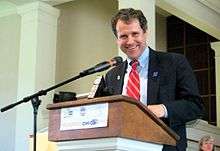
Brown supported the Patient Protection and Affordable Care Act, voting for it in December 2009,[51] and he voted for the Health Care and Education Reconciliation Act of 2010.[52]
LGBT rights
Brown voted against prohibiting same-sex couples from adopting children in Washington D.C. He received a 100% score from the Human Rights Campaign in 2005-2006, indicating a pro-gay rights stance.[53] On December 18, 2010, he voted in favor of the Don't Ask, Don't Tell Repeal Act of 2010.[54]
Education

In 2015, Brown introduced the Charter School Accountability Act of 2015, which would seek to curb "fraud, abuse, waste, mismanagement and misconduct" in charter schools.[55]
Brown praised West Virginia teachers who held a nine-day strike in early 2018. "When this society fails to pay its teachers a living wage, it's pretty shameful," he said. "Those teachers engaged the public to put pressure on a Republican legislature that historically underfunds education and they got the legislature to finally do the right thing. So I was proud of those teachers for standing up." He also praised other recent activist demonstrations, such as the anti-gun protests by Parkland High School students in Florida and the Women's March after President Trump's inauguration. "That's what makes our country great — when people stand up and push back when they're mistreated," he said.[56]
Intellectual property
Brown was a cosponsor of the Protect-IP Act (PIPA).[57]
Trade
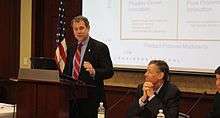
Brown has criticized free trade with China and other countries. In a 2006 Washington Post article, Brown argued against free trade on the grounds that labor activism was responsible for the growth of the U.S. middle class, and that the U.S. economy is harmed by trade relations with countries that lack the kind of labor regulations that have resulted from that activism.[58]
In 2011, the Columbus Dispatch noted that Brown "loves to rail against international trade agreements."[59] Brown's book, Myths of Free Trade, argues that "an unregulated global economy is a threat to all of us."[60] In his book, he recommends adopting measures that would allow for emergency tariffs, protect Buy America laws, including those that give preference to minority and women-owned businesses, and hold foreign producers to American labor and environmental standards.[61] Brown was the co-author and sponsor of a bill that would officially declare China a currency manipulator and require the Department of Commerce to impose countervailing duties on Chinese imports.[62]
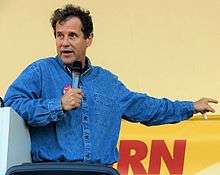
In May 2016, Brown called for tariffs to be imposed on imports from China and praised Hillary Clinton's plan to enforce rules and trade laws and triple the enforcement budgets at the United States Department of Commerce and the International Trade Commission.[63]
Brown opposes NAFTA.[64]
In January 2018, Brown expressed support for President Trump's decision to impose tariffs on washing machine imports.[65]
Employment
In 2012, Brown wrote a letter to the United States Department of Defense requesting that it comply with a rule requiring members of the military to wear clothes made in the U.S.[66]
In a 2016 CNN interview, Brown criticized Donald Trump for making "a lot of money apparently by outsourcing jobs to China."[63]
Elections
- 2006


In August 2005, Brown announced he would not run for the United States Senate seat held by Republican Mike DeWine.[67] In October, however, Brown reconsidered his decision.[68] His announcement came shortly after Democrat Paul Hackett stated that he would soon announce his candidacy.
On February 13, 2006, Hackett withdrew from the race, all but ensuring that Brown would win the Democratic nomination. In the May 2 primary, Brown won 78.05% of the Democratic vote. His opponent, Merrill Samuel Keiser Jr., received 21.95% of the vote.[69]
In the middle of his Senate campaign in April 2006, Brown, along with John Conyers, brought an action against George W. Bush and others, alleging violations of the Constitution in the passage of the Deficit Reduction Act of 2005.[70] The case, Conyers v. Bush, was ultimately dismissed for lack of standing.[71]
On November 7, 2006, Brown faced two-term incumbent senator Mike DeWine in the general election. Brown won the seat with 56% of the vote to DeWine's 44%.[72]
- 2012
Brown stood for reelection in 2012, defeating opponent Josh Mandel, who in 2010 had defeated the incumbent state treasurer by 14 points. Mandel raised $2.3 million in the second quarter of 2011 alone, to Brown's $1.5 million.[73] Early on, Brown enjoyed a steady lead in the polls.[74] Mandel won the March Republican primary with 63% of the vote.[75]
The Washington Post reported that no candidate running for reelection, save Barack Obama, faced more opposition in 2012 by outside groups. As of April 2012, over $5.1 million had been spent on television ads opposing Brown, according to data provided by a Senate Democratic campaign operative. The United States Chamber of Commerce spent $2.7 million. 60 Plus Association, a conservative group that opposes health care reform, spent another $1.4 million. Karl Rove's Crossroads GPS and the Concerned Women for America Legislative Action Committee also spent heavily in the race.[76] In May 2012, Brown campaigned with West Wing actor Martin Sheen.[77]
Controversial remarks
In March 2011, Brown came under scrutiny for a Senate floor speech in which he cited the names of Adolf Hitler and Joseph Stalin while he criticized Republican efforts in Ohio and Wisconsin to mitigate the power of public employee unions to negotiate with taxpayers. In his speech he said "some of the worst governments that we've ever had, do you know one of the first things they did? They went after unions. Hitler didn't want unions, Stalin didn't want unions, Mubarak didn't want independent unions".[78] In his speech, Brown said "I'm not comparing what's happened to the workers in Madison or in Columbus to Hitler and Stalin." He later apologized for his speech.[79][80][81]
Committee assignments (115th Congress)
- Committee on Agriculture, Nutrition, and Forestry[82]
- Committee on Banking, Housing, and Urban Affairs (Ranking Member)[83]
- Subcommittee on Economic Policy (Ex-Officio)
- Subcommittee on Financial Institutions and Consumer Protection (Ex-Officio)
- Subcommittee on Housing, Transportation, and Community Development (Ex-Officio)
- Subcommittee on National Security and International Trade and Finance (Ex-Officio)
- Subcommittee on Securities, Insurance, and Investment (Ex-Officio)
- Committee on Finance[84]
- Committee on Veterans' Affairs[85]
Personal life
Brown's second wife, Connie Schultz, is a former newspaper columnist at the Cleveland Plain Dealer, but resigned because being a politician's spouse presented a conflict of interest.[86] She won a Pulitzer Prize in 2005.[87] She is also the author of Life Happens (2007) and ...and His Lovely Wife (2008), in which she describes her experiences as the spouse of a U.S. Senate candidate.[88] Brown was previously married to Larke Recchie from 1979 to 1987. Brown is the father of four children: two from his marriage to Recchie and two children from his marriage to Schultz. He has five grandchildren.[89]
On May 18, 2014, Brown was awarded an honorary doctor of public service degree from Otterbein University. Along with his wife, Brown delivered a keynote address at the undergraduate commencement.[90]
Books authored
Brown is the author of two books:
Electoral history
| Party | Candidate | Votes | % | |
|---|---|---|---|---|
| Democratic | Sherrod Brown | 304,952 | 34 | |
| Democratic | Dennis Kucinich | 246,618 | 27 | |
| Democratic | Anthony Calabrese | 214,901 | 24 | |
| Democratic | Francis Gaul | 136,568 | 15 | |
| Party | Candidate | Votes | % | |
|---|---|---|---|---|
| Democratic | Sherrod Brown | 1,739,602 | 54 | |
| Republican | Virgil Brown | 1,362,079 | 42 | |
| Libertarian | Margaret Ann Leech | 143,943 | 4 | |
| Party | Candidate | Votes | % | |
|---|---|---|---|---|
| Democratic | Sherrod Brown (inc.) | 1,805,833 | 60 | |
| Republican | Vincent Campanella | 1,217,803 | 40 | |
| Party | Candidate | Votes | % | |
|---|---|---|---|---|
| Republican | Bob Taft | 1,809,416 | 53 | |
| Democratic | Sherrod Brown (inc.) | 1,604,058 | 47 | |
| Party | Candidate | Votes | % | |
|---|---|---|---|---|
| Democratic | Sherrod Brown | 134,486 | 53 | |
| Republican | Margaret R. Mueller | 88,889 | 35 | |
| Independent | Mark Miller | 20,320 | 8 | |
| Independent | Tom Lawson | 4,719 | 2 | |
| Independent | Werner J. Lange | 3,844 | 2 | |
| Party | Candidate | Votes | % | |
|---|---|---|---|---|
| Democratic | Sherrod Brown | 93,147 | 49 | |
| Republican | Gregory A. White | 86,422 | 46 | |
| Independent | Howard Mason | 7,777 | 4 | |
| Independent | John M. Ryan | 2,430 | 1 | |
| Party | Candidate | Votes | % | |
|---|---|---|---|---|
| Democratic | Sherrod Brown | 148,690 | 61 | |
| Republican | Kenneth C. Blair, Jr. | 87,108 | 36 | |
| Natural Law | David Kluter | 8,707 | 4 | |
| Party | Candidate | Votes | % | |
|---|---|---|---|---|
| Democratic | Sherrod Brown | 116,309 | 62 | |
| Republican | Grace L. Drake | 72,666 | 38 | |
| Party | Candidate | Votes | % | |
|---|---|---|---|---|
| Democratic | Sherrod Brown | 170,058 | 65 | |
| Republican | Rick H. Jeric | 84,295 | 32 | |
| Libertarian | Michael Chmura | 5,837 | 2 | |
| Natural Law | David Kluter | 3,108 | 1 | |
| Party | Candidate | Votes | % | |
|---|---|---|---|---|
| Democratic | Sherrod Brown | 123,025 | 69 | |
| Republican | Ed Oliveros | 55,357 | 31 | |
| Party | Candidate | Votes | % | |
|---|---|---|---|---|
| Democratic | Sherrod Brown | 201,004 | 67 | |
| Republican | Robert Lucas | 97,090 | 33 | |
| Party | Candidate | Votes | % | |
|---|---|---|---|---|
| Democratic | Sherrod Brown | 583,776 | 78 | |
| Democratic | Merrill Samuel Keiser, Jr. | 163,628 | 22 | |
| Party | Candidate | Votes | % | |
|---|---|---|---|---|
| Democratic | Sherrod Brown | 2,257,369 | 56 | |
| Republican | Mike DeWine | 1,761,037 | 44 | |
| Independent | Richard Duncan (write-in) | 830 | 0 | |
| Party | Candidate | Votes | % | |
|---|---|---|---|---|
| Democratic | Sherrod Brown | 2,762,757 | 51 | |
| Republican | Josh Mandel | 2,435,740 | 45 | |
| Independent | Scott Rupert | 250,617 | 4 | |
See also
References
- ↑ Connie Schultz (July 15, 2014). "Why I Came Home to Cleveland". Politico.
- ↑ "Senate Democrats lock in key committee memberships." The Hill. (December 12, 2014).
- ↑ LimaOhio. "Pension committee holds first meeting". Retrieved April 11, 2018.
- ↑ 1. Sherrod Campbell Brown from freepages.genealogy.rootsweb.com
- 1 2 3 4 5 Hayes, Christopher (November 21, 2015). "Who is Sherrod Brown?". In These Times. Retrieved July 25, 2016.
- ↑ "About". SherrodBrown.com. Retrieved August 16, 2012.
- ↑ "America's ethnic makeover routs Mitt Romney". The Times Of India.
- ↑ Barone, Michael (2004). Almanac of American Politics. The National Journal.
- ↑ "Ohio: Thirteenth District". 1998 Almanac. National Journal. Archived from the original on August 18, 2012. Retrieved August 16, 2012.
- ↑ "Democratic Leaders Reid, Hoyer Say Cafta Will Fail". Bloomberg L.P. May 3, 2005. Archived from the original on September 25, 2013. Retrieved August 16, 2012.
- ↑ Nagourney, Adam (May 7, 2006). "Early Intensity Underlines Role of Races in Ohio". New York Times. Retrieved August 16, 2012.
- ↑ "Roll Call vote, Defense of Marriage Act" clerk.house.gov. Retrieved August 29, 2011.
- ↑ "Congressional Committees". Open Secrets. Center for Responsive Politics. Archived from the original on July 19, 2012. Retrieved August 16, 2012.
- ↑ Dovere, Edward-Isaac; Debenedetti, Gabriel (June 7, 2016). "Inside the bitter last days of Bernie's revolution". Politico. Retrieved January 25, 2018.
- ↑ Terris, Ben (July 24, 2017). "Sherrod Brown thinks he could have helped Democrats win in 2016. But what about 2020?". Washington Post. Retrieved January 25, 2018.
- ↑ Allen, Jonathan; Parnes, Amie (2017). Shattered: Inside Hillary Clinton's Doomed Campaign. New York: Crown. p. 259. ISBN 978-0-553-44708-8.
- ↑ Tucker, D.R. (May 21, 2017). "What Can Brown Do for the Democratic Party?". Washington Monthly. Retrieved January 25, 2018.
- ↑ Sylvan, Lane (May 18, 2017). "Sherrod Brown looks to defy Trump trend in Ohio". The Hill. Retrieved January 25, 2018.
- ↑ Mihalchik, Carrie (February 28, 2011). "Most Liberal Members of Congress". National Journal. Archived from the original on September 25, 2011. Retrieved September 14, 2011.
- ↑ Kazin, Michael. "Working Too Hard for Too Little: An Interview with Senator Sherrod Brown". Dissent. Retrieved May 24, 2018.
- ↑ Roll Call vote, Iraq War resolution from house.gov
- ↑ "Sherrod Brown on War & Peace". Ontheissues.org. Retrieved March 28, 2012.
- ↑ "H.R.2642 - Supplemental Appropriations Act, 2008". Congress.gov. Retrieved January 26, 2018.
- ↑ http://freebeacon.com/senate-nuclear-containment-is-not-an-option-with-iran/
- ↑ "Senators Approve Iran Sanctions Amendment In Unanimous Vote". Think Progress. March 27, 2015. Retrieved July 21, 2016.
- ↑ H.Con.Res.56 - Commemorating the 20th anniversary of the Taiwan Relations Act., Congress.gov, March 17, 1999
H.Con.Res.53 - Concerning the Taiwan Relations Act., Congress.gov, November 3, 1999
H.Con.Res.117 - Expressing the sense of Congress that the United States Government should reaffirm its unwavering commitment to the Taiwan Relations Act as the cornerstone of United States relations with Taiwan, and for other purposes., Congress.gov, March 25, 2003
S.Con.Res.38 - A concurrent resolution reaffirming the Taiwan Relations Act and the Six Assurances as cornerstones of United States-Taiwan relations., Congress.gov, May 19, 2016 - ↑ "Wicker Joins Bill to Support Hong Kong's Freedom and Democracy". Roger Wicker. November 13, 2014. Retrieved July 22, 2016.
S.2922 - Hong Kong Human Rights and Democracy Act, Congress.gov, November 13, 2014
"China 'Voids' Hong Kong Rights: Beijing abrogates the 1984 treaty it signed with Britain to guarantee the city's autonomy". The Wall Street Journal. December 14, 2014. Retrieved July 22, 2016.
"A Useful Hong Kong Rebuke: China's betrayal of its promises becomes a U.S. political issue". The Wall Street Journal. January 30, 2015. Retrieved July 22, 2016. - ↑ "Senate Votes With Record Opposition to Saudi Arms Sale — but Not Enough to Put On Brakes". The Intercept. June 14, 2017.
- ↑ "HR 1540 National Defense Authorization Act for Fiscal Year 2012 - Voting Record". Project Vote Smart. Retrieved April 5, 2012.
- ↑ "Sen. Sherrod Brown outlines bill aimed at stopping terrorism". NBC news. January 8, 2016. Retrieved July 19, 2016.
- ↑ "U.S. Senator Sherrod Brown tackles ISIS, gun laws". ABC news. January 8, 2016. Retrieved July 19, 2016.
- ↑ "S.2377 - Defeat ISIS and Protect and Secure the United States Act of 2015". Congress.gov. Retrieved January 24, 2018.
- 1 2 SIEGEL, BENJAMIN; KELSEY, ADAM. "House Republicans pass tax plan that would cut corporate rate, add $1.4 trillion to deficit". ABC News. Retrieved May 25, 2018.
- ↑ KOFF, STEPHEN. "Sen. Sherrod Brown's "no" vote on tax cuts will stand out as Vice President Mike Pence comes to town. Will it hurt him?". Cleveland.com. Retrieved June 19, 2018.
- ↑ "CBO - S. 2323". Congressional Budget Office. August 12, 2014. Retrieved September 11, 2014.
- ↑ Albrecht, Brian (September 11, 2014). "Gold Star Fathers Act gets salute from U.S. Senate". Cleveland.com. Retrieved September 12, 2014.
- ↑ "Brown: Give Vets Priority in Scheduling College Classes". Business Journal. February 9, 2015. Retrieved July 18, 2016.
- ↑ www.congress.gov
- ↑ Toto, Deanne (April 11, 2012). "A Contentious Issue". Recycling Today. Retrieved January 24, 2018.
- ↑ "Ask Sherrod Brown: Why Does He Oppose Your Freedoms?". NRA-ILA. Retrieved October 9, 2017.
- ↑ Pierce, Charles P. (June 21, 2016). "The Sheer Number of Guns in America Will Kill Us With or Without Terrorists". Esquire. Retrieved October 9, 2017.
- ↑ Shesgreen, Deidre. "Brown: Ohio concealed-carry bill work of 'lunatics'". Cincinnati.com. Retrieved October 9, 2017.
- ↑ Mathis-Lilley, Ben; Hannon, Elliot (June 15, 2016). "Senate Democrats' Surprise Gun-Control Filibuster Ended at 2:11 a.m." Slate. Retrieved October 9, 2017.
- ↑ Everhart, Michelle. "Ohio Politics Now: How Sen. Rob Portman, Sen. Sherrod Brown voted on gun control measures". The Columbus Dispatch. Retrieved October 9, 2017.
- ↑ Koff, Stephen. "Sen. Sherrod Brown backs 'bump stock' gun-control bill, while Sen. Rob Portman says he'll review it". cleveland.com. Retrieved October 9, 2017.
- ↑ "Time to break up the big banks" Archived July 29, 2013, at the Wayback Machine. George F. Will, Washington Post, February 8, 2013
- ↑ "Senate Democrats Urge Treasury Department to Probe Panama Papers". New York Magazine. April 7, 2016. Retrieved July 19, 2016.
- ↑ "Stimulus bill approved". Columbus Dispatch. February 14, 2009. Retrieved January 25, 2018.
- ↑ Laura Arenschield, Bills would force government to warn residents of lead-contaminated water, Columbus Dispatch, February 3, 2016
- ↑ Michael Wines & John Schwartz, Unsafe Lead Levels in Tap Water Not Limited to Flint, New York Times, February 8, 2016
Jo Ingles, U.S. Senator Sherrod Brown Wants Water Tested In Ohio's Schools, Statehouse News Bureau, May 3, 2016 - ↑ "U.S. Senate: Legislation & Records Home > Votes > Roll Call Vote". Senate.gov. Retrieved February 23, 2012.
- ↑ "U.S. Senate: Legislation & Records Home > Votes > Roll Call Vote". Senate.gov. Retrieved August 29, 2010.
- ↑ "Sherrod Brown on Civil Rights" On the Issues. Retrieved August 29, 2011.
"Sherrod Brown on the Issues" On the Issues. Retrieved August 29, 2011. - ↑ "U.S. Senate: Legislation & Records Home > Votes > Roll Call Vote". Senate.gov. Retrieved February 23, 2012.
"Senate Vote 281 - Repeals 'Don't Ask, Don't Tell'". The New York Times. Archived from the original on October 27, 2015. - ↑ "Ohio Sen. Sherrod Brown introduces national charter school reforms". Akron Beacon Journal. July 9, 2015. Retrieved July 19, 2016.
"SHERROD BROWN: Ensuring our tax dollars are spent on education, not fraud and abuse". The Clermont Sun. October 28, 2015. Retrieved July 19, 2016. - ↑ Mimms, Sarah. "Sen. Sherrod Brown Said West Virginia Teachers Strike Is "What Makes Our Country Great"". Buzzfeed. Retrieved 12 June 2018.
- ↑ "S.968: PIPA - U.S. Congress". OpenCongress. Archived from the original on February 15, 2012. Retrieved February 23, 2012.
- ↑ Dorgan, Byron; Brown, Sherrod (December 23, 2006). "How Free Trade Hurts". Washington Post.
- ↑ Torry, Jack (August 29, 2011). "Mandel could give Sherrod Brown a real race". The Columbus Dispatch.
- ↑ Brown, Sherrod (2006). Myths of Free Trade: Why American Trade Policy Has Failed. New York: The New Press. p. 4. ISBN 978-1-59558-124-2.
- ↑ Brown, Sherrod (2006). Myths of Free Trade: Why American Trade Policy Has Failed. New York: The New Press. pp. 201–207. ISBN 978-1-59558-124-2.
- ↑ Weisman, Jonathan (September 15, 2011). "The Schumer-Brown-Romney Bill?". Washington Wire. Wall Street Journal. Retrieved September 18, 2011.
"Congress Tackles Chinese Currency Manipulation". Fox News. Associated Press. October 1, 2011. Retrieved July 18, 2016. - 1 2 Interview With Ohio Senator Sherrod Brown, CNN, May 15, 2016
- ↑ Werner, Erica (April 4, 2018). "Ohio workers love Trump's tariffs, and that's making trouble for the GOP". Washington Post. ISSN 0190-8286. Retrieved April 5, 2018.
- ↑ Monk, Jonathan (January 24, 2018). "Senator Sherrod Brown applauds President Trumps washing machine tariffs". WTOL. Retrieved January 25, 2018.
- ↑ Defense Department Pushed to Buy 'Made in America' Military Uniforms, ABC news, October 18, 2012
- ↑ Provance, Jim (August 19, 2005). "Sherrod Brown's advocates saddened – Polls can't convince him to seek Senate". Toledo Blade. Retrieved January 18, 2010.
- ↑ Tankersley, Jim (October 6, 2005). "Brown confirms he will challenge DeWine for Senate seat". Toledo Blade. Archived from the original on 16 June 2012. Retrieved January 18, 2010.
- ↑ 2006 Election Results Archived June 13, 2006, at the Wayback Machine. from sos.state.oh.us
- ↑ "11 House Members to Sue Over Budget Bill". ABC News. Associated Press. April 27, 2006. Archived from the original on February 5, 2009. Retrieved February 20, 2007.
- ↑ "Judge Dismisses Budget Bill Lawsuit". ABC News. Associated Press. November 6, 2006. Archived from the original on February 3, 2009. Retrieved November 28, 2006.
- ↑ "U.S. Senate / Ohio". American Votes 2006. CNN. Retrieved May 23, 2010.
- ↑ Koff, Stephen. "Ohio Treasurer Josh Mandel raises whopping $2.3 million for U.S. Senate race". The Plain Dealer. Retrieved September 18, 2011.
- ↑ "2012 Ohio Senate Race". RCP Averages. Real Clear Politics. Retrieved August 21, 2011.
- ↑ "2012 Ohio Senate Primary results". Politico. Retrieved March 28, 2012.
- ↑ Stein, Sam (April 6, 2012). "Sherrod Brown Campaign In Ohio Faces $5 Million Ad Barrage Without Help". The Washington Post. Retrieved May 30, 2012.
- ↑ "Martin Sheen hits the trail with Sherrod Brown". Politico. Retrieved May 30, 2012.
- ↑ "Sherrod Brown: Hitler Hated Unions, Just Like The GOP". The Atlantic Wire. March 3, 2011. Retrieved May 31, 2012.
- ↑ "Brown invokes Hitler, Stalin in Senate speech on labor unions". Daytondailynews.com. March 3, 2011. Archived from the original on March 9, 2011. Retrieved February 23, 2012.
- ↑ "Sen. Brown apologizes for Hitler, Stalin comment". The Columbus Dispatch - Dispatch.com. March 4, 2011. Archived from the original on March 7, 2011. Retrieved February 23, 2012.
- ↑ Sarah Wright, Chillicothe Gazette. "Sherrod Brown apologizes for Hitler remarks". cleveland.com. Retrieved February 23, 2012.
- ↑ "Committee Membership | The United States Senate Committee On Agriculture, Nutrition & Forestry". www.agriculture.senate.gov. Retrieved 2018-08-01.
- ↑ "Membership | United States Committee on Banking, Housing, and Urban Affairs". www.banking.senate.gov. Retrieved 2018-08-01.
- ↑ "Membership | The United States Senate Committee on Finance". www.finance.senate.gov. Retrieved 2018-08-01.
- ↑ "Committee Members | United States Senate Committee on Veterans' Affairs". www.veterans.senate.gov. Retrieved 2018-08-01.
- ↑ "Connie Schultz, Plain Dealer Columnist". cleveland.com. Archived from the original on August 25, 2010. Retrieved August 29, 2010.
- ↑ The 2005 Pulitzer Prize Winner in Commentary: Connie Schultz of The Plain Dealer, Cleveland.
- ↑ "...AND HIS LOVELY WIFE by Connie Schultz". Kirkus Review. May 20, 2010. Retrieved January 25, 2018.
- ↑ Rogin, Ali (July 27, 2016). "Sherrod Brown: Everything You Need to Know". ABC News. Retrieved October 22, 2016.
- ↑ "Senator and Writer Duo Address Commencement". Otterbein Towers (Early Summer 2014): 7. Retrieved June 29, 2015.
- 1 2 3 4 5 6 7 8 9 "Election Statistics". Office of the Clerk of the House of Representatives. Retrieved January 10, 2008.
External links
| Wikimedia Commons has media related to Sherrod Brown. |
- Sherrod Brown official U.S. Senate site
- Sherrod Brown for Senate
- Sherrod Brown at Curlie (based on DMOZ)
- Biography at the Biographical Directory of the United States Congress
- Profile at Vote Smart
- Financial information (federal office) at the Federal Election Commission
- Legislation sponsored at the Library of Congress
- Appearances on C-SPAN
- Sherrod Brown columns at HuffPost
- Collected news and commentary at the Cleveland Plain Dealer

.svg.png)

